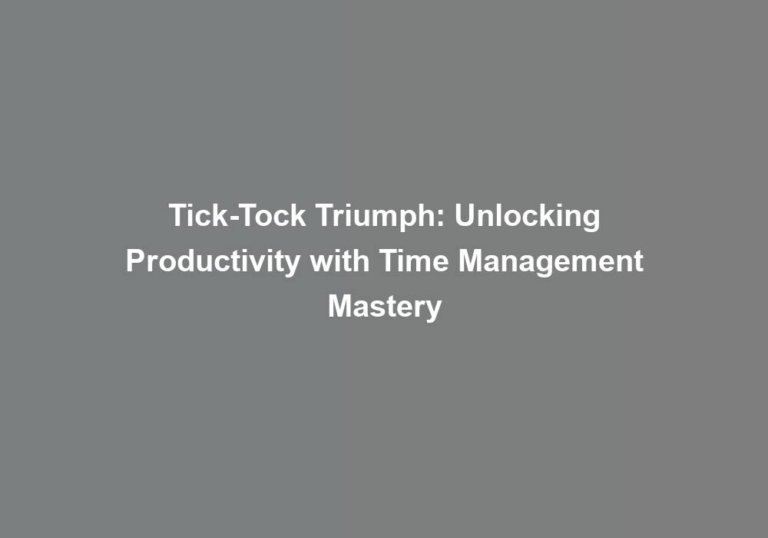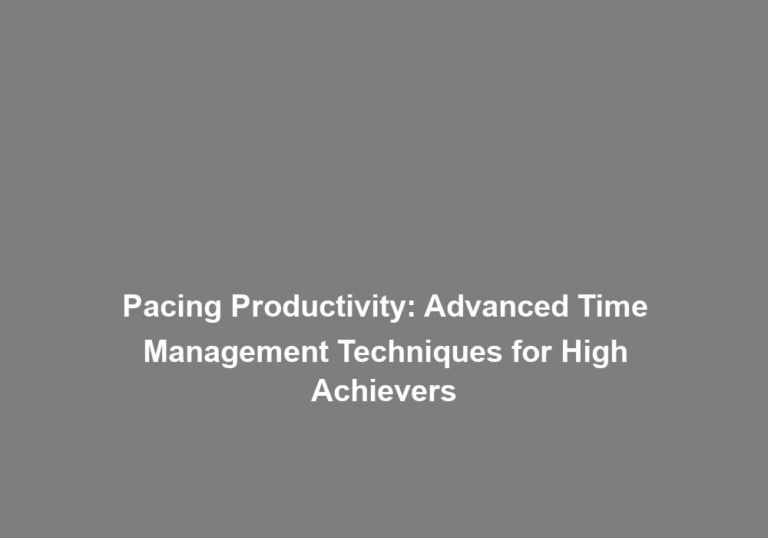Equilibrium Essentials: Time Management Tactics for Work-Life Harmony
In the hustle and bustle of modern life, finding the delicate balance between work and personal time can often feel like walking a tightrope. But fear not, because in the forthcoming discussion, we will explore practical and effective time management tactics that will help you navigate the demands of your professional and personal life with finesse. These equilibrium essentials are designed to equip you with the tools and strategies necessary to reclaim control over your schedule, allowing you to enjoy a sense of harmony and fulfillment in both your professional and personal pursuits.
Setting Priorities and Boundaries
To achieve work-life harmony, start by setting clear priorities and boundaries to ensure a balanced and fulfilling lifestyle. Prioritizing tasks is essential for managing your time effectively. Begin by identifying the most important tasks that align with your long-term goals and values. By focusing on these priorities, you can allocate your time and energy more efficiently, leading to a greater sense of accomplishment and fulfillment.
Establishing limits is equally important in maintaining a healthy balance between work and personal life. Learn to say no when necessary and communicate your boundaries to others. This empowers you to avoid taking on more than you can handle and allows you to dedicate quality time to both your professional responsibilities and personal activities. ItG??s okay to set boundaries to protect your personal time and well-being. By doing so, you cultivate a sense of respect for your own needs and demonstrate to others the importance of work-life balance.
Streamlining Daily Tasks
As you establish clear priorities and boundaries, you can now focus on streamlining your daily tasks to optimize your time and achieve work-life harmony. Efficient organization is key to maximizing productivity. Begin by evaluating your daily routine and identifying areas that can be simplified. For instance, consider creating daily to-do lists that prioritize tasks based on urgency and importance. This will help you allocate your time and energy more effectively, ensuring that essential tasks are completed promptly. Additionally, leverage technology to your advantage. Explore apps and tools that can automate repetitive processes, such as scheduling meetings or sending routine emails. By doing so, you free up valuable time for more impactful work or personal activities.
Moreover, optimizing your physical workspace is crucial. Keep frequently used items within easy reach and declutter your desk to minimize distractions. A clean and organized workspace can enhance focus and efficiency. Furthermore, consider batch processing similar tasks together. Grouping similar activities, such as responding to emails or making phone calls, allows you to maintain momentum and avoid unnecessary context switching, ultimately saving time and mental energy. Streamlining your daily tasks not only boosts productivity but also creates space for a more balanced and fulfilling life. By simplifying processes, you pave the way for greater work-life harmony, enabling you to excel professionally while also nurturing personal well-being.
Effective Delegation Techniques
Maximize your efficiency and productivity by mastering effective delegation techniques. Clear communication is essential when delegating tasks to others. ItG??s important to clearly outline the expectations, deadlines, and any specific requirements for the task. By doing so, you ensure that the person to whom you are delegating fully understands what is expected of them, which minimizes the likelihood of misunderstandings or errors. Additionally, providing clear guidelines empowers the individual to take ownership of the task and complete it more effectively.
Trusting relationships are also crucial when it comes to effective delegation. Building strong, trusting relationships with your colleagues or team members fosters an environment where delegation can thrive. When there is mutual trust, individuals are more likely to feel comfortable delegating tasks to others and confident that those tasks will be completed to the required standard. Furthermore, when people feel trusted, they are often more motivated to perform well and exceed expectations.
Maximizing Productivity With Time Blocks
Building upon the foundation of effective delegation techniques, you can enhance your productivity by implementing time blocks to structure your workday efficiently. Time blocking is a powerful productivity hack that helps you focus on specific tasks during dedicated time periods, allowing you to make the most of your workday. Here are five ways time blocking can help you maximize productivity:
-
Focused Work: By allocating specific time blocks for different tasks, you can fully concentrate on one task at a time without distractions, leading to increased efficiency and quality of work.
-
Prioritization: Time blocking encourages you to prioritize tasks and allocate time according to their importance, ensuring that essential tasks are completed without being overshadowed by less critical ones.
-
Reduced Procrastination: Setting aside dedicated time for each task creates a sense of urgency, reducing the likelihood of procrastination and promoting a proactive approach to completing tasks.
-
Improved Work-Life Balance: Time blocking allows you to allocate specific time for work and personal activities, helping you achieve a better work-life balance and reducing the risk of work spilling into personal time.
-
Enhanced Focus and Creativity: By scheduling time blocks for breaks and relaxation, you can recharge and rejuvenate your mind, leading to improved focus and creativity during work periods.
Incorporating time blocks into your daily routine can significantly enhance your productivity and work-life harmony, making it a valuable strategy for achieving a balanced and fulfilling lifestyle.
Nurturing Self-Care Practices
You can foster a healthy work-life balance by prioritizing nurturing self-care practices as an essential component of your daily routine. Taking the time for self-reflection is crucial for maintaining your overall well-being. Self-reflection allows you to check in with yourself, understand your emotions, and identify areas in your life that may need attention. This practice can help you gain clarity and perspective, leading to a more balanced and harmonious lifestyle.
In addition to self-reflection, stress reduction is paramount in nurturing self-care practices. Find activities that help you unwind and relax, such as meditation, yoga, or simply taking a walk in nature. Engaging in these activities can significantly reduce stress levels, improve your mood, and enhance your overall quality of life. ItG??s important to recognize that prioritizing your mental and emotional health is not selfish but rather a vital part of maintaining a balanced and fulfilling life.
Conclusion
Now that youG??ve mastered the art of setting priorities, streamlining tasks, delegating effectively, and maximizing productivity with time blocks, itG??s time to nurture self-care practices. Imagine a garden, each bloom needing care and attention to thrive. Just like the delicate petals, your well-being requires nurturing too. By incorporating self-care into your daily routine, youG??ll achieve a harmonious equilibrium, allowing you to flourish in both your professional and personal life.







